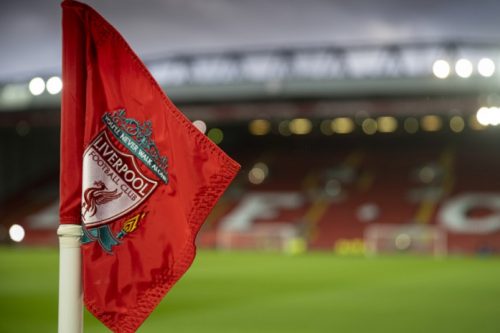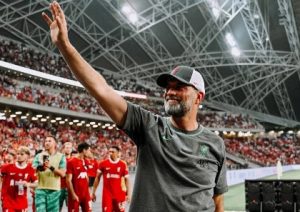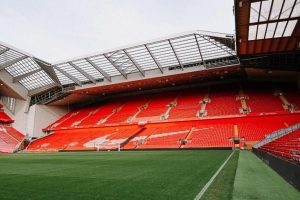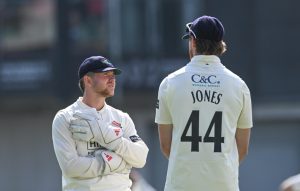Trepidation as Reds’ ‘heavy metal football’ faces a re-set under new boss

Liverpool fans will enter the 2024-25 season with an unfamiliar feeling of uncertainty.
A serious assault on league and cup competitions is the norm for Reds fans with the prospect of glory in at least one highly anticipated.
But this season the side will be without legendary manager, Jürgen Klopp, who stood down in May, nine years after joining the Anfield set-up, after previous success with Borussia Dortmund.

Jürgen Klopp – courtesy LFC
His ‘heavy metal’ playing style has faced a re-set under new coach, Arne Slot, the Dutchman who Liverpool prised away from Feyenoord to fill the considerable gulf left by his former German counterpart.
His are big shoes to fill, and the pressure will be on Slot to hit the ground running and continue the club’s admirable progress, both on and off the pitch.
Progress on all fronts is seen as a key requirement of any Reds boss.
January 26, 2024, will be seen as a dark day in Liverpool’s recent history, when Klopp announced to the world that he would leave his role at the end of the season.
Hopes were high that, galvanised by his shock departure, the team could triumph on league and cup fronts.
However, despite clinching the EFL Cup a month later, their challenge fell away, with quarter final exits in both the FA Cup and UEFA Europa League, and, eventually, relinquishing top spot to bitter rivals, Manchester City, who claimed the Premiership crown.
At least Liverpool’s third place in the final standings guarantees lucrative Champions League competition in the coming season.
Prolonged participation on Europe’s ultimate stage is vital to the financial wellbeing of the club, which has expended hundreds of millions of pounds on stadium redevelopments, including its main stand and, most recently, the £80m expansion of the Anfield Road stand, which takes the stadium capacity to 61,276.
Andy Hughes, LFC’s managing director, emphasised the value of keeping the turnstiles clicking when he said earlier this year: “Matchday revenue is a hugely important part of our overall financial sustainability model.
“Having the ability to grow our controllable income streams is a crucial part of our long term plans, which enables us to continue reinvesting both on and off the pitch to support both our men’s and women’s teams’ ambitions.”

New Anfield Road stand (courtesy LFC)
He said the Anfield Road extension was key to this: “We’re really excited to see the completion of the new Anfield Road Stand in the coming months. Having a record league attendance this year demonstrates just how far we’ve come since starting the significant capital investment to redevelop Anfield 10 years ago.”
Getting more bums on seats boosts the coffers and was an element in a disappointing set of financial figures for the most recent period, to May 31, 2023, when elimination from cup competitions hit match, and commercial income.
The club revealed it had made a pre-tax loss of £9m during the reporting period, and income had remained stagnant at £594m.
The figures told differing stories. On one hand, the club’s commercial revenues increased by £25m to £272m during the 2022-23 season to become the biggest revenue source across its three main income streams, above matchday ticket sales and media revenue.
The increase in commercial revenue, helped by deals with kit supplier Nike, Peloton, UPS, Orion Innovation and Google Pixel, lifted commercial income,.
But matchday sales dropped £7m to £80m and TV and media revenue fell by £19m to £242m, mainly due to the previous season’s exit from the Champions League in the last-16 stage, compared with reaching the final in the previous season, and fewer, revenue-generating games being played.
However, one area the club is excelling in is its international appeal, led by its unrivalled social media status.
During the last reporting period, Liverpool boosted its international revenue stream with seven new stores opening across Asia, and more than 350,000 downloads of the new LFC Store app.
It was also a record year for footfall across all of the club’s global LFC stores, peaking at 2.5 million shoppers, which included more than 10,000 every matchday at the club’s souvenir shops.
From a digital perspective, it was during this reporting period that LFC became the first club in the Premier League to reach eight million YouTube subscribers and surpassed 40 million followers on both Instagram and Facebook.
LFC now has more than 173 million cumulative social followers across its men’s and women’s social media channels.
Managing director, Andy Hughes, said at the time: “Operating this great club in a financially sustainable manner and in accordance with football’s governing principles has been our priority since FSG acquired LFC in 2010.
“Despite the significant growing costs of football, the success of our commercial operations demonstrates the strength of our underlying financial position so we can continue to operate sustainably while competing at the highest levels of football.
“While these financial results are a moment in time on our journey, what remains constant is the growing global appeal of the club and, thanks to our amazing support, LFC continues to be the most-globally-followed club in the Premier League.”

![ESPN™+[Minnesota Timberwolves Vs Golden State Warriors] Ways To Watch NBA Playoff West Semifinals Game 1 Live Stream [PPV] and TV Channel](https://www.thebusinessdesk.com/northwest/wp-content/themes/thebusinessthemeMKII/assets/images/bg-white.png)






